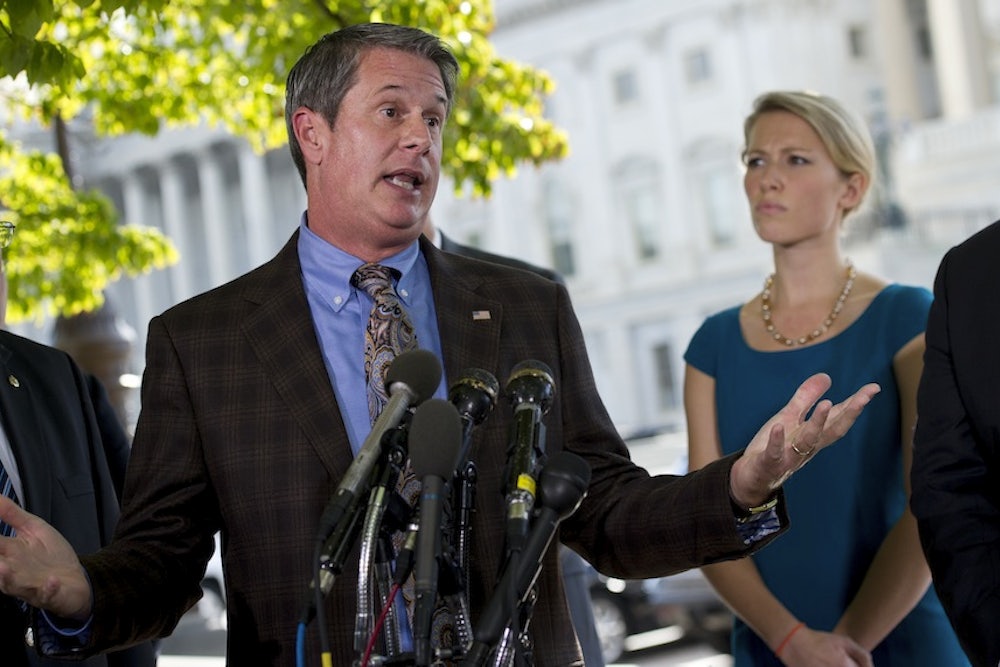In Republican primary politics it's taken as a given that candidates will scatter rightward toward the sweet spot between reason and disqualifying insanity. Some will inevitably overshoot. But Obamacare was supposed to be the one issue for which there existed no right-most bound—the issue around which conservatives were allowed, or even expected, to let their freak flags fly. To shed all moderating impulses.
It was definitely not supposed to strengthen those impulses. But that's what it's doing in at least one high profile race, in which the frontrunner—one of the most conservative statewide officeholders in the country—is staking out an early, relatively liberal position.
"We need to improve and reform Medicaid, and I want to look at everything that could be brought to bear to do that. Now, could more federal resources help to do that? They could, if it's done right and if it's done in a constructive way."
We've come to expect pronouncements like these out of blue- and purple-state Republican governors or gubernatorial hopefuls. But not David Vitter. In the years since the prostitution scandal that permanently defined him, Senator Vitter has kept a relatively low profile. But he emerged late last year to embarrass most of his fellow Capitol Hill Republicans by staking out the view that Congress should stop subsidizing congressional employee health benefits under Obamacare.
So he's no stranger to the scatter-rightward impulse. But he's also seen Louisiana's unpopular current governor Bobby Jindal struggle with the absolutist position on Obamacare, and wants to replace Jindal who's up against a term limit in 2015. So Vitter's is actually triangulating against the current governor—banking against the possibility that some other hardliner will outmaneuver him. Vitter still boasts of his efforts to repeal Obamacare on his Senate website. But Running anti-Medicaid expansion isn't good politics. Even in Louisiana.
This kind of doublespeak isn't new. But as Affordable Care Act enrollment inches toward 9 million, skeptical carriers announce that they'll enter the marketplaces next year, and others announce nominal premium hikes, it's becoming common in more and more conservative states.
So if David Vitter is playing footsie with the Medicaid expansion, and Mitch McConnell is trying to have it both ways on Medicaid and Kynect—his state's immensely successful and popular insurance exchange—how do things look for Republicans who stand much longer odds of winning seats in November.
Republicans in New Hampshire and Oregon actually based entire candidacies around the conceit that Obamacare would be a historic failure and make voters yearn for new representation in the Senate. To the extent that this conceit was ever persuasive, it was persuasive in these particular Obama states because Obama's not on the ballot this year, and because Obamacare really did have serious problems in both places. Only one carrier participated in New Hampshire this year. And Oregon's exchange just didn't work—like, ever, at all.
But Oregon still managed to sign up a whole lot of people, particularly in Medicaid. And four more insurers will be participating in New Hampshire's exchange next year. So I'm sure it's a complete coincidence that, with the pretexts of their candidacies collapsing, Monica Wehby in Oregon and Scott Brown in New Hampshire are in a dead heat with one another to come up with the most gibbering nonsense anytime they're asked about Obamacare.
Wehby is currently fending off attacks from conservatives for claiming to support repeal while simultaneously proposing to "fix" it in ways that would actually just destroy the insurance market. Brown by contrast prefers a stepping on rakes approach, which has the benefit of being too aimless and clumsy to draw pointed, substantive criticism from his own side, but isn't exactly the confident opposition were led to expect from Obamacare dead-enders late last year.
I want to believe that small things like premising lies on the assumption that voters are stupid and stumbling into outright nonsense can still help determine election outcomes. What's saving all of these candidates today is an unusual conspiracy of timidity. Democrats don't particularly want to make the election about Obamacare. And more and more—as the implications of the conservative view grow less and less tenable, and Fox News moves on to safer obsessions—neither do Republicans.
